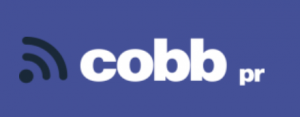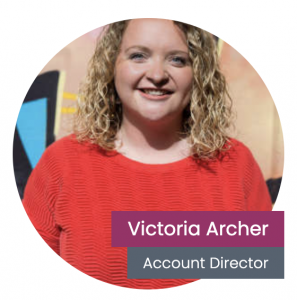Interview with a PR Professional
by Thomas Checkley, Design Enterprise Studio Member, March 2021
Hello, my name is Tom Checkley and I am currently in the Design Enterprise Studio at UWE. For my blog entry I have interviewed Victoria Archer, a professional in marketing and PR. Before we start, I’d like to share something that I found really interesting, Victoria currently lives in Florida, USA but still works for a Brighton-based agency. This change of work style is something that’s becoming more prominent in the digital industry, especially since the Covid-19 pandemic.
What is your name and job title?
 “Hi, I’m Victoria Archer and I am an accounts director at Cobb PR. We are a PR agency based on the south coast in Eastbourne and work in partnership with our sister agency, Cobb Digital which predominantly focuses on digital marketing. My role sits in the middle of both to help integrate all our marketing campaigns.”
“Hi, I’m Victoria Archer and I am an accounts director at Cobb PR. We are a PR agency based on the south coast in Eastbourne and work in partnership with our sister agency, Cobb Digital which predominantly focuses on digital marketing. My role sits in the middle of both to help integrate all our marketing campaigns.”
What does the company do as a whole?
 “I think from the PR side we offer really anything to do with the media, so media training or crisis communication support or press release writing, any sort of writing or anything really that is focused on a brand, a company, an organisation, a charity’s reputation in the public eye and then on the digital side we cover everything from email marketing, website, SEO, digital ads, Google, Facebook and then organic social media and content writing as well specially for websites and blogs.”
“I think from the PR side we offer really anything to do with the media, so media training or crisis communication support or press release writing, any sort of writing or anything really that is focused on a brand, a company, an organisation, a charity’s reputation in the public eye and then on the digital side we cover everything from email marketing, website, SEO, digital ads, Google, Facebook and then organic social media and content writing as well specially for websites and blogs.”
What other jobs have you had within the digital industry?
“When I graduated I worked with Cobb PR and did an internship for 18 months. I then moved to London and worked for a PR agency called Spider PR and predominately focused on corporate communications for FedEX and Tryrols. I then moved back to continue working with Cobb, looking at how we integrate our digital marketing campaigns and PR campaigns. We now work with a lot of regional and local organisations whether that’s estate agencies, tourism boards, local councils to make sure that all our campaigns are integrated, cross channel and every area is supported depending on who our audience is and what our aims and objectives are.”
Whats the difference between studying digital marketing and putting it in to practice in the real world?
“I guess it is different in terms of being told what you need to do and more than being told what you need to do; thinking about what you should be doing and being quite proactive in thinking about what you want to do and offering up ideas. I think that’s something that I found really hard to begin with because I was very conscious that I was new and I had only just graduated and so I probably stayed quite quiet.
I think actually everything helps or offers a different perspective, for example one of our team joined us a few years ago as a graduate. She was amazing because she just threw out ideas even if she didn’t know the history of the client we were working with, she didn’t know if we had tried something before and whether it had worked or not but it was just really great to have a different perspective. So I think the difference is being confident to think aloud even if you don’t know things.
Also at Uni I was managing my own time and so if I left something later than I should have done then that was on me, whereas now it is not just me. If you’re working in a team you’re co-ordinating with a lot of other people and its not fair to other people to leave something late, so I think its being more efficient with time and working as a team to help that.”
What have you learned from your early career stages?
“I really think just try and learn from the people around you and act as a sponge in terms of picking things up. For me with digital marketing, stuff changes all the time, like Google announces new updates all the time, Facebook is updating different walls , new products, Instagram recently launched a gift guide, like gifting platforms. What has helped me in continually trying to keep up is reading a lot of industry support, doing the free training Google and Facebook offers because that gives you a really good basis and a good understanding and just trying to stay on top.
Also you need to really try to get into the heads of clients and try to understand – for example, if they’re a tourism destination – what their audiences want. Try and put yourself in their shoes so that you are making decisions from data. Understand what their trends are and how they respond to certain things so then you’ve got the best chance of being a success.
Just listen to as much as you can and even if you don’t really understand it all [at first]. When I first started I did not understand half the things professionals were talking about, like SEC or value for Google and all of that, but I think that gradually you listen more and then it starts to make sense. Don’t be afraid to ask questions, I was always asking heaps of questions and actually that’s fine, people are always willing to help you if they can, that is something to really keep in mind.”
What would you say is the most difficult thing about your job?
“I think for me it’s managing expectations, so at the moment I look after 8-10 clients, some of those are much smaller than others, some much bigger. The biggest challenging is managing timelines, deadlines, the expectation of what clients want and when they want it.
A challenging thing recently were the frequent announcements from [the UK] Government that change things for my clients. For example, we work with a group of leisure centres and so all the different tiers, all the different announcements means they can open, they can close, they can do gym group classes, they’re not doing group classes, the swimming can open, there are heaps and its been a real challenge to keep on top of what is relevant for all our clients at different points and being able to get the information out quite quickly.
Also sometimes we work with a marketing manager of a company, sometimes we work with a managing director or chief executive who started the company and the challenge then is being able to communicate why we are recommending a certain thing and why we think its going to be beneficial. Being able to explain things easily and efficiently and really using that expertise [is key].”
What would you find is most interesting about your job?
“I think for me working for an agency the most interesting thing is all those 10 clients are completely different so its really interesting working in different sectors, so for some clients we work really hard on Facebook campaigns because we know that’s going to be a real success but on another client we might solely focus on their website and optimise it for search.
Absolutely the best thing is being able to say to a client we want to do this because we think it will achieve x y and z and then at the end being able to go back and say yes it worked and we’ve increased say website sessions because of this page or because of this Facebook campaigns we’ve had 25 sign ups to something, or we’ve sold out of something else – that’s really a winner, being able to share our success with the clients.”
How do you see the industry moving forward, where do you see it going to from now?
“I think everything will just keep getting more and more personalised especially in advertising. I think in terms of what’s possible now – through Facebook and Google, the data it collects and how you can manipulate and use that – I think it is going to go much further than you just getting an an email or an ad that says: ‘Tom, have you seen this?’ or ‘Tom, did you forget what you had in your basket?’.
I think it is going to really look at people’s habits and how they change. For retail marketing this is very interesting because now throughout 2020 people have been taking much more care and made much more considered decisions about where they’re buying from. The rise of ‘support local’ and ‘buy local’ has been huge. People are very conscious of that now and making much more considered choices when they’re buying from a brand, and so moving forward I think marketing is going to be much more tailored to shared values.
Or if you know your audience and making a considered decision because you have a completely sustainable supply chain and you are committing to minimise plastic, I think you’re going to see that come through much more than just being ‘buy now’, ‘do this’ because people are taking more time and being more thoughtful and considered in what they are doing.”
Thank you very much for reading, I hope you enjoyed the interview. For further information please feel free to contact me at thomas2.checkley@live.uwe.ac.uk.
